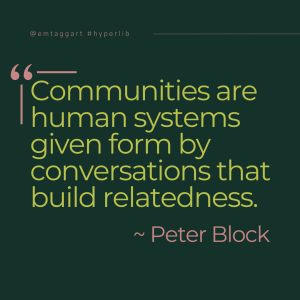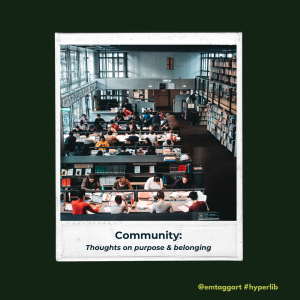I loved the storytelling module. I’m presenting my reflection in two related parts – personal and on the readings.
Personal Reflection:
I grew up surrounded by storytellers in Appalachian storytelling culture. Friends, family, neighbors – we were and still are all storytellers.
My elementary school librarian brought world-famous storytellers to our library by partnering with the International Storytelling Center headquartered in nearby Jonesborough, Tennessee. Through this partnership, we learned the art of timing and gestures from master storytellers like Jackie Torrence, who inspired my friends and me to test the limits of just how tall our tales could get.
Stories bring my ancestors back to life and make the ghosts of vanished landmarks appear. I grew up listening and asking questions as my relatives wove tales with echoes of old grudges and unanswered questions in the gaps. I smiled and couldn’t help laughing when someone struggled to get through the giggles of joyful recall. We let our local (gruesome) urban legends run wild.
I learned about history through storytelling. I carry my grandfather’s stories with me about how scary it was to be a young kid flying a B-26 on bombing missions in France and Germany, sometimes being the only plane that made it back. When I miss visiting with him, I can listen to his stories in the Library of Congress Archives.
Because of stories, I know who I am, where I am, and where I come from.
Because of stories, I know what’s possible.
I know we all have stories still in the making.
Reflection on the readings:
I am interested in how the Human Library model could work in the US. My one critique and this may be just a matter of translation or difference in culture, is describing people as human books. When I read this, it felt very “othering” – like making people into objects. I softened on this reading the Human Library’s DEI and Safe Framework statements that expand on the purpose of the storytelling experiences the organization curates for its audience as opportunities for connection to break barriers, bias, and prejudice.
The Human Library reminded me of the 2023 US Surgeon General’s Advisory on Our Epidemic of Loneliness and Isolation. The report dives deep into the data showing that our social networks are shrinking. The report presents that this epidemic is not a personal or individual problem but a societal issue. It’s not your problem you’re lonely – it’s our problem that we’re increasingly isolated from each other. Some of the proposed remedies for the US loneliness epidemic are to “Strengthen social infrastructure in local communities…invest in local Institutions that bring people together,” and “build a culture of connection” (p. 47). The library is the perfect institution to build this connection.
Libraries brings people physically (and virtually) together. Stories create community and weave connections. Storytelling programs at libraries must do more than “give people access” to someone they would not normally engage with. Storytelling is exchange of experiences that create human connection (a.k.a. community) rather than content consumption or parasocial attachment (as happens with social media).
Connection is an antidote to isolation and loneliness. This can happen at the library.
Convergence of thought:
As we’ve been discussing in our comments, we are living in a heavy moment in time rife with disconnection. I think much of our disconnection and isolation can be mended by storytelling. Not content consumption. Storytelling.
Stories are time travel.
Stories are community builders.
Stories are medicine.
Let’s share our stories and find new ones to tell together.

